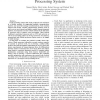Free Online Productivity Tools
i2Speak
i2Symbol
i2OCR
iTex2Img
iWeb2Print
iWeb2Shot
i2Type
iPdf2Split
iPdf2Merge
i2Bopomofo
i2Arabic
i2Style
i2Image
i2PDF
iLatex2Rtf
Sci2ools
123
click to vote
ICAC
2006
IEEE
2006
IEEE
Utility-aware Resource Allocation in an Event Processing System
— Event processing systems link event producers and consumers in a flexible manner, by supporting multiple communication patterns and powerful message transformations. Such systems support both loosely coupled communication patterns, such as one-to-one or one-to-many, and tightly coupled (request-response) patterns. An important concern in these systems is the allocation of resources used to support event processing. These include traditional constrained resources such as CPU and network, as well as an increasing reliance on storage resources. For instance, transactional and reliable producers require events to be logged to stable storage. In this paper we consider the problem of utility driven allocation of these resources, taking into account resource capacity. In contrast to previous work, we (1) develop a unified utility model to deal with throughput requirements of one-way flows and latency requirements of request-response flows, (2) differentiate between classes of consumer...
Autonomic Computing | Communication Patterns | Event Processing | Event Processing Systems | ICAC 2006 |
Related Content
| Added | 11 Jun 2010 |
| Updated | 11 Jun 2010 |
| Type | Conference |
| Year | 2006 |
| Where | ICAC |
| Authors | Sumeer Bhola, Mark Astley, Robert Saccone, Michael J. Ward |
Comments (0)

